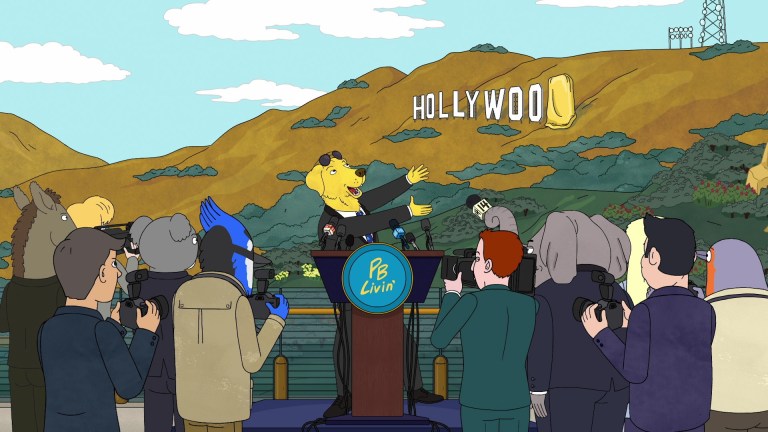BoJack Horseman: Why Mr. Peanutbutter Isn’t as Clueless as He Acts
Why Mr. Peanutbutter, the saddest, goodest boy in Hollywoo deserved a mental health break on BoJack Horseman.

Most fans know BoJack Horseman for its wacky animal cast, quippy puns, and moving exploration of mental illness. But as creator Raphael Bob-Waksberg once told Variety, BoJack Horseman is also a series centered on “showbiz satire.” A crucial element of the critically beloved hit is how its storylines critique the entertainment industry’s seedy underbelly.
BoJack Horseman season 2 used its Bill Cosby-like arc to remind audiences how often Hollywood sweeps sexual assault allegations under the rug. Sarah Lynn (Kristen Schaal) embodied the role of the ill-fated child star – tragically depicting how the pressures, unrealistic demands, and ambition of stardom can lead to substance abuse and death. BoJack (Will Arnett) illustrated how easily creative executives turn a blind eye toward a star’s untreated trauma if they’re a cash-horse for a network.
On the surface, Mr. Peanutbutter (Paul F. Tompkins) seems to be one of the only well-adjusted characters in L.A. With a GOODBOY license plate, Mr. Peanutbutter is known for doing as he’s told. His big acting break only happens because he walks onto a pilot’s set accidentally and someone told him to stay. So, he does, jumpstarting an acting career dependent on people-pleasing. He happily accepts any work he’s given – even if it’s a low-paying gig like a commercial for Seaborn Seahorse Milk.
Fittingly, Mr. Peanutbutter is a yellow labrador – one of the friendliest dog breeds – and is overflowing with the need to give affection. Throughout BoJack Horseman, the dogged character loves getting validation, giving pep talks, and cracking bad jokes. In a certain light, it’s easy to cast him as dim-witted and happy-go-lucky, but his struggles are there if you care to look.
Mr. Peanutbutter is the poster child for what The Wrap recently called “the show must go on” actors of Hollywood. We don’t see him spiral out of control like BoJack or wrestle with finding creative inspiration and the toll that takes as Diane (Alison Brie) did. He serves the spotlight without qualms. While we sadly won’t see a 2022 BoJack Horseman episode critiquing The Wrap’s take, Mr. Peanutbutter’s storyline is a great way to unpack how flawed and harmful this idea of a “grin-and-bear-it” approach is.
The article argues that too many actors are taking mental health breaks – framing mental illness as something to work through/use for “performances,” regardless of how it affects stars’ health. Ironically, this approach treats actors like they’re circus animals, failing to realize that the “show must go on” showbiz adage was P.T. Barnum’s heartless response after an 1889’s circus train crashed six cars, killing his animals. If that’s what’s missing from Hollywood, let it be gone. Let it be forgotten.
There are nihilistic cracks in Mr. Peanutbutter’s “keep smiling” demeanor that highlight the wear-and-tear fame has had on him. After all, he once told Diane: “The universe is a cruel, uncaring void. The key to being happy isn’t a search for meaning. It’s to just keep yourself busy with unimportant nonsense, and eventually, you’ll be dead.” That moment showcases how Mr. Peanutbutter is aware of his busy life as a coping method.
He knows that his schemes to build his own Disneyland, run for governmental office, or portray a character based on a birthday card are outlandish ways to distract him from a dark realization: his life doesn’t have any meaning for him. He has built a life of appealing to others and hasn’t had the time to please himself. It’s hard not to wonder what would have happened if Mr. Peanutbutter never left the Labrador Peninsula, a place where he could have played as much ball as he wanted without worrying about whether or not he was relevant.
Mr. Peanutbutter’s self-awareness exists in fleeting moments because he’s deeply uncomfortable with thinking sad or troubling thoughts. When he does open up the tightly sealed compartmentalized parts of his brain, he reveals how lonely he feels. By season 6 of BoJack Horseman, Mr. Peanutbutter has had three ex-wives and an ex-fiance. He compares his love life to a Christopher Nolan movie, questioning, “Is my problem with women any movie directed by Christopher Nolan? Because, yes, women are involved, but it’s never really about the women. It’s about me.”
Whereas BoJack cannot stop self-reflecting, Mr. Peanutbutter chooses to run from it. One of the core issues during his marriage to Diane was his denial. When things become complicated in their marriage, Mr. Peanutbutter dials up the optimism and leans away from having difficult conversations: his positivity infuriates Diane, as she feels guilty that it’s so much harder for her to be happy than him. But he fails to admit how it’s so much harder for him to reflect on things like regret or loss. As Tompkins once told GQ, “So often they have these breakthroughs and it seems like they’re on the same page, and then before too long, it unravels again. You’re also rooting for it because Mr. Peanutbutter is a positive guy who’s in pain.”
Sure, Mr. Peanutbutter doesn’t always “get” things – like why fracking is bad for the world, even if a giant drill sounds cool. Due to his dog-like persona, and growing up in a family that shielded painful things from him (like his parents’ deaths), he is quick to miss essential social cues. He is easily distracted by a tennis ball. But he hears every snide mark BoJack makes about him. His lack of confrontation isn’t because he isn’t aware of the world around him. He is. He just has the same essential fear that BoJack has: people will always leave him if he shows them his full and messy self. Mr. Peanutbutter’s way of conquering that is to play overly nice.
In addition to it being a fun way for animators to explore characterization, it feels like no coincidence that BoJack and Mr. Peanutbutter are depicted as animals that humans have domesticated. Metaphorically, it feels like a clever way to comment on how humanity looks at stars to entertain us, but only when and how it’s convenient for our needs.
Unlike BoJack, who was the happiest when he was a running horse in the wild, Mr. Peanutbutter doesn’t push back against others or have existential monologues about his role in the world. A huge crux of the series is watching how these two ‘90s sitcom stars diverge in their life choices but ultimately end in the same car together in the series finale. They know the world once loved them. But the fickleness of fame created big holes in both of them to fill whenever the world’s attention waivered to someone else.
Most of us will never have to experience what it feels like to endure the spotlightand how that pressure affects our relationships. Nor will we have to feel the hollowness connected to losing that amount of attention, praise, and success. BoJack Horseman ends with a 50-something-year-old Mr. Peanutbutter finally telling BoJack that he’s focusing on himself. His habit of chasing romance to fill his need for constant approval and affection is over. But it’s sorrowful to think about how long it took him to realize that he didn’t love himself as much as others.
If Mr. Peanutbutter took the time to learn this earlier, you never know what could have happened with his life choices. The show ends without us really seeing what this version of Mr. Peanutbutter wants and needs. No one should ask stars to put their mental health on hold for the sake of other’s entertainment: actors aren’t dancing monkeys, puppets on a string, or even happy-go-lucky golden dogs. We owe them more than that.
